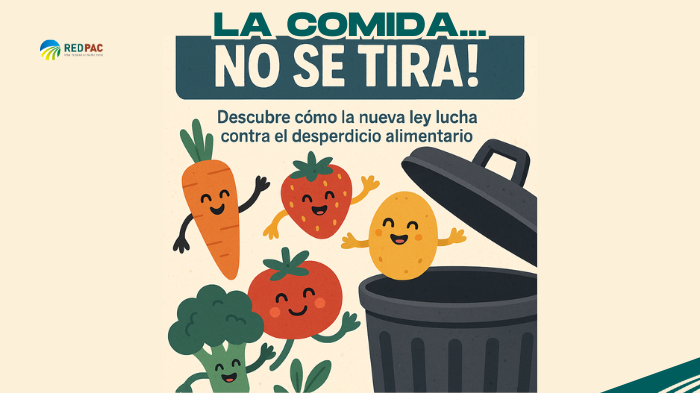
04 de August de 2025
Cambio climático y gestión de recursos naturales
Calidad y cadena alimentaria
Resiliencia y competitividad
The information session was held virtually with the aim of familiarizing stakeholders in the agri-food sector with Law 1/2025.
- The information session was held virtually with the aim of familiarizing stakeholders in the agri-food sector with Law 1/2025.
- The hierarchy of priorities is established as a key element of the law, establishing the order of preferential action.
What does the new Law 1/2025 imply for those who produce, process, distribute, or serve food? To answer this and other questions, the PAC Network organized the virtual information session "Law on the Prevention of Food Loss and Waste" on July 21.
The objectives of this day were the following:
Explain the content and scope of the new law.
Clarify the obligations imposed on the various agents in the food chain.
To publicize good practices already included in the standard.
Place this law in the context of European and international policies.
Contents of the day
During the session, the key points of Law 1/2025 were addressed:
Strategy of the Ministry of Agriculture, Fisheries and Food (MAPA) combats food waste: campaigns such as "Nothing is thrown away here," quantification panels, and awareness-raising actions.
Scope : affects the entire food chain, from production to distribution, including the hospitality industry, social entities and public administrations.
General obligations for all agents in the chain:
Apply a hierarchy of priorities that establishes the preferred order of action.
Have a waste prevention plan.
Establish donation and redistribution agreements.
Specific obligations for:
Hospitality: reusable containers, the option to take uneaten food home...
Social entities: donation traceability, security, and inclusion.
Public administrations: training, incorporating good practices into their food services and developing guidelines on these practices, control, and monitoring.
Flexibility measures according to company size:
Micro-enterprises or small farms are exempt from some obligations.
Requirements adapted to the surface area and volume of activity of each entity.
Examples of good practices :
Promote the sale of imperfect products.
Encourage the consumption of foods with an expiration date approaching.
More flexible menus in restaurants.
Penalties provided for:
Minor: up to 2,000 euros (for example, not applying the hierarchy of priorities).
Serious: up to 60,000 euros (for example, not having a prevention plan).
Very serious: up to 500,000 euros (for repeated serious violations).
Other content
The event was led by Ana Díaz Pérez, deputy general director, along with Marta Pérez, assistant deputy director of Food Quality and Sustainability at MAPA, who emphasized that the new law "is not intended to be punitive, but rather transformative." It was emphasized that the goal is to protect what costs so much to produce, improve the efficiency of the food system, and foster a more circular and supportive economy.
The hierarchy of priorities was one of the key ideas of the session because it summarizes the fundamental points of the regulations through the following steps:
Prevention: Adjust production and transform surpluses such as fruit into jam.
Surplus management : donate, allocate to animal feed or other industries.
Waste recovery : composting, recycling or energy use.
The event also provided an opportunity to contextualize this law within the framework of other international policies. The waste reduction targets set by the 2030 Agenda and the role of the European Union (EU) Platform on Food Loss and Waste , which brings together Member States, NGOs, research centers, and companies, were analyzed.
Spain is the fourth country in the EU that generates the least food waste, and Law 1/2025 aims to take a further step in improving efficiency in the food chain, reducing environmental impact, and maximizing food value.
The presentations and content of the event are available on the PAC Network website .









